- Home
- Quizzes
- My Quiz Activity
- Newsletters
- Sports Betting
- MY FAVORITES
- Add Sports/Teams
- SPORTS
-
NFL
- NFL Home
- Arizona Cardinals
- Atlanta Falcons
- Baltimore Ravens
- Buffalo Bills
- Carolina Panthers
- Chicago Bears
- Cincinnati Bengals
- Cleveland Browns
- Dallas Cowboys
- Denver Broncos
- Detroit Lions
- Green Bay Packers
- Houston Texans
- Indianapolis Colts
- Jacksonville Jaguars
- Kansas City Chiefs
- Las Vegas Raiders
- Los Angeles Chargers
- Los Angeles Rams
- Miami Dolphins
- Minnesota Vikings
- New England Patriots
- New Orleans Saints
- New York Jets
- New York Giants
- Philadelphia Eagles
- Pittsburgh Steelers
- San Francisco 49ers
- Seattle Seahawks
- Tampa Bay Buccaneers
- Tennessee Titans
- Washington Commanders
-
MLB
- MLB Home
- Athletics
- Arizona Diamondbacks
- Atlanta Braves
- Baltimore Orioles
- Boston Red Sox
- Chicago White Sox
- Chicago Cubs
- Cincinnati Reds
- Cleveland Guardians
- Colorado Rockies
- Detroit Tigers
- Houston Astros
- Kansas City Royals
- Los Angeles Angels
- Los Angeles Dodgers
- Miami Marlins
- Milwaukee Brewers
- Minnesota Twins
- New York Yankees
- New York Mets
- Philadelphia Phillies
- Pittsburgh Pirates
- San Diego Padres
- San Francisco Giants
- Seattle Mariners
- St. Louis Cardinals
- Tampa Bay Rays
- Texas Rangers
- Toronto Blue Jays
- Washington Nationals
-
NBA
- NBA Home
- Atlanta Hawks
- Boston Celtics
- Brooklyn Nets
- Charlotte Hornets
- Chicago Bulls
- Cleveland Cavaliers
- Dallas Mavericks
- Denver Nuggets
- Detroit Pistons
- Golden State Warriors
- Houston Rockets
- Indiana Pacers
- Los Angeles Clippers
- Los Angeles Lakers
- Memphis Grizzlies
- Miami Heat
- Milwaukee Bucks
- Minnesota Timberwolves
- New Orleans Pelicans
- New York Knicks
- Oklahoma City Thunder
- Orlando Magic
- Philadelphia 76ers
- Phoenix Suns
- Portland Trail Blazers
- Sacramento Kings
- San Antonio Spurs
- Toronto Raptors
- Utah Jazz
- Washington Wizards
-
NHL
- NHL Home
- Anaheim Ducks
- Boston Bruins
- Buffalo Sabres
- Calgary Flames
- Carolina Hurricanes
- Chicago Blackhawks
- Colorado Avalanche
- Columbus Blue Jackets
- Dallas Stars
- Detroit Red Wings
- Edmonton Oilers
- Florida Panthers
- Los Angeles Kings
- Minnesota Wild
- Montreal Canadiens
- Nashville Predators
- New Jersey Devils
- New York Islanders
- New York Rangers
- Ottawa Senators
- Philadelphia Flyers
- Pittsburgh Penguins
- San Jose Sharks
- Seattle Kraken
- St. Louis Blues
- Tampa Bay Lightning
- Toronto Maple Leafs
- Utah Hockey Club
- Vancouver Canucks
- Vegas Golden Knights
- Washington Capitals
- Winnipeg Jets
- NCAAF
- NCAAM
- Olympics
- Boxing
- Entertainment
- Lifestyle
- Golf
- MMA
- Soccer
- Tennis
- Wrestling
- More Sports
- RESOURCES
- My Account
- YB on Facebook
- YB on Twitter
- YB on Flipboard
- Contact Us
- Privacy Policy
- Terms of Service
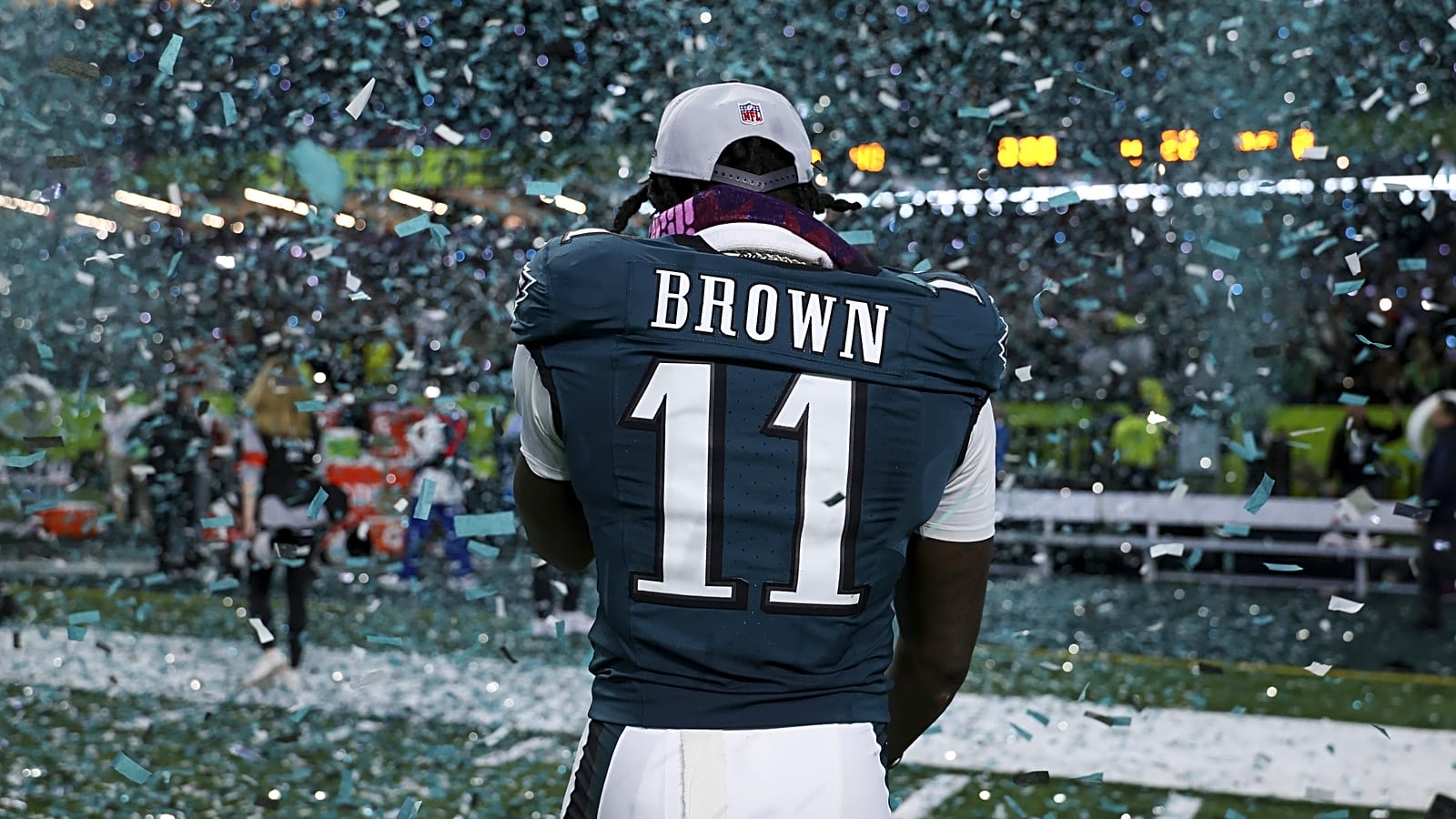
The most impactful NFL wide receiver trades of all time
The Titans continued a busy run of wide receiver trades by agreeing to send a second-round pick to the Falcons for Julio Jones. But teams have gone to the trade market to improve their wideout situations for decades. Here are the most significant wide receiver deals ever.
The most impactful NFL wide receiver trades of all time

Two top-five wide receivers have been dealt in the early days of the 2022 league year, making it a good time to revisit the biggest wideout trades in NFL history. Teams have gone to the trade market to improve their wideout situations for decades. Here are the most significant receiver deals ever.
Giants bolster air attack, acquire Rams' Del Shofner
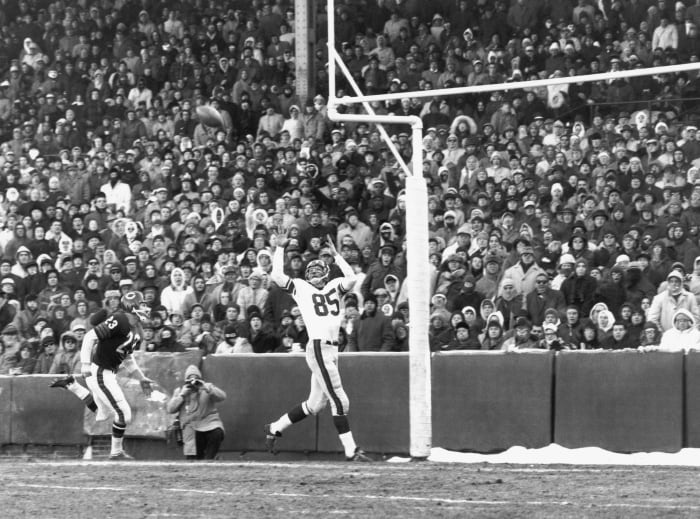
Already a two-time All-Pro with the Rams, Shofner joined Y.A. Tittle in revitalizing the Giants' passing game. Both players were traded to New York in August 1961, the deep threat going for what became the 1962 No. 2 overall pick (obtained from the Vikings). While the Giants were hesitant due to Shofner's down 1960 season, he had his three best years from 1961-63 — the Tittle-Shofner connection lifting Big Blue to three NFL title games. Shofner put together 1,100-yard seasons in each of those years, becoming a five-time All-Pro. The Rams landed future MVP Roman Gabriel with the pick.
Cleveland, Washington swap Bobby Mitchell, Ernie Davis
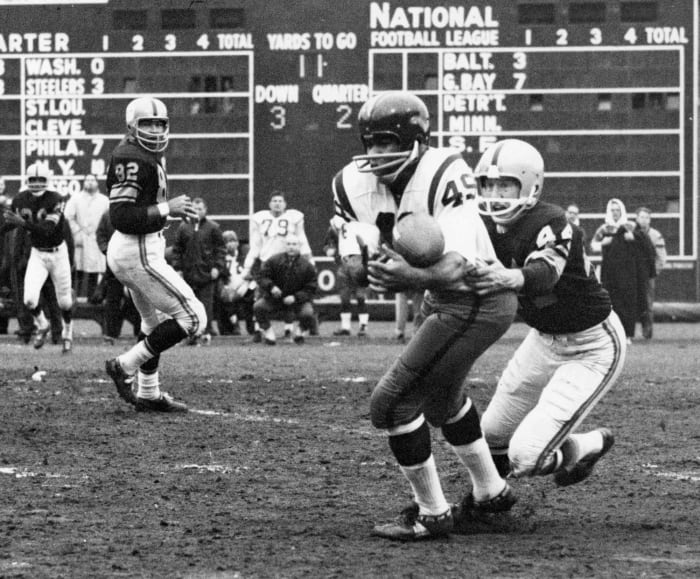
It took Washington until 1962 to integrate. Mitchell became the team's first Black player. The Browns traded the four-year veteran to Washington for No. 1 overall pick Ernie Davis. (This trade occurred shortly after the draft, held in December 1961.) Jim Brown was no fan of the move, preferring Mitchell's complementary skill set to an overlap with the Heisman winner. Washington moved Mitchell from running back to receiver. He led the NFL in receiving in 1962 and '63 and became a Hall of Famer. Diagnosed with leukemia in the summer of 1962, Davis never played an NFL down. He died in 1963.
Dolphins rise up after landing Browns' Paul Warfield
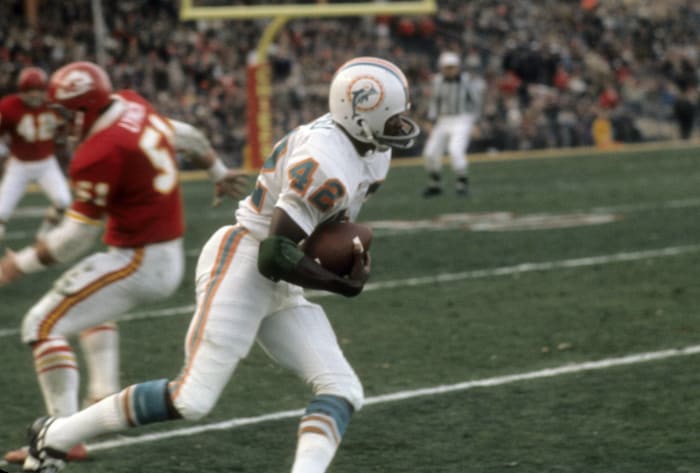
Prior to the 1970 arrivals of Warfield and Don Shula, the Dolphins went 15-39-2 in their first four years. In the five subsequent seasons, Miami made five playoff berths and won two Super Bowls. Warfield was a key part of the Browns' 1964 championship and caught 22 TDs in his final two Cleveland seasons. Cleveland traded its deep threat for Miami's No. 3 overall pick in 1970 and drafted QB Mike Phipps. Despite joining a run-first team, Warfield thrived in Florida, cementing Hall of Fame credentials. Phipps guided the Browns to two playoff berths, the second ending in a loss to the 1972 Dolphins.
Roman Gabriel deal sends Harold Jackson back to Rams
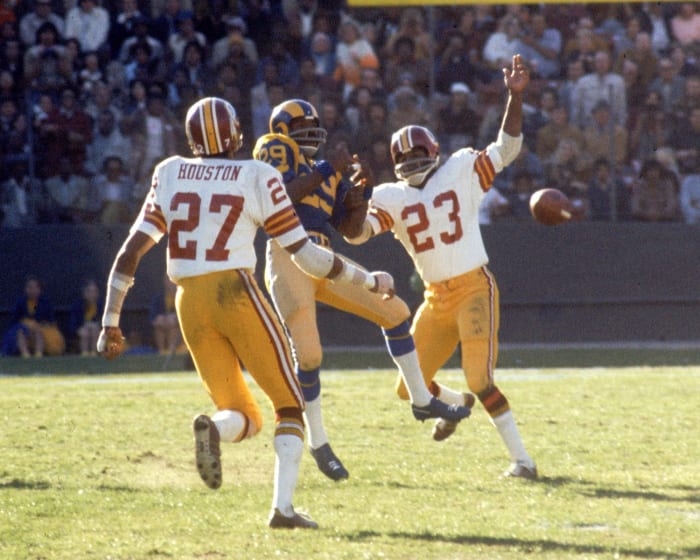
One of the biggest quarterback deals turned out better for the team that added the wide receiver. The Eagles traded Harold Jackson back to the Rams as part of a massive package, which included two first-round picks, for 33-year-old Roman Gabriel in 1973. While Gabriel fizzled after a strong '73 season, Jackson — one of three long-term Los Angeles starters acquired here — delivered three Pro Bowl campaigns (including a 13-TD All-Pro '73 slate) and played in eight Rams playoff games. Originally a Rams 1968 draft choice, Jackson was traded to the Patriots in 1978. He played 16 NFL seasons.
Chargers, Bengals complete eventful Charlie Joiner deal
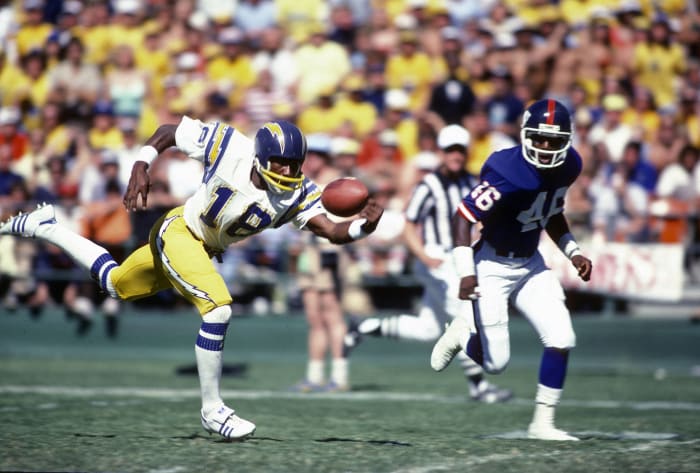
Traded from Houston to Cincinnati in 1972, Joiner did not take off as a Bengal. But he caught a career-defining break in April 1976, when the Bengals traded him to the Chargers for a package headlined by defensive end Coy Bacon. The pass rusher's two-year Ohio tenure stands out; Bacon recorded 21.5 sacks in 1976. But the Chargers won this trade. Rejoining ex-Bengals assistant Bill Walsh — the Bolts' OC for one season — Joiner notched his first 1,000-yard season in '76. The Hall of Famer later became Air Coryell's senior member, playing 11 Chargers seasons and retiring as the NFL's receiving leader.
Seahawks hand Vikings rejuvenated Ahmad Rashad

Prior to his lengthy TV career, the former "NBA Inside Stuff" host was an accomplished wide receiver. A 1976 trade from Seattle to Minnesota ignited Rashad's NFL career. A Pacific Northwest native, Rashad signed with the expansion Seahawks in 1976 but clashed with the coaching staff. They traded the former Cardinals and Bills target to the Vikings for a fourth-round pick. Rashad made four Pro Bowls, from 1978-81, helping Minnesota transition from Fran Tarkenton to Tommy Kramer, and his Hail Mary grab that secured the 1980 NFC Central title remains an all-time Vikings moment.
Dolphins deal Freddie Solomon to 49ers

After sending five picks to the Bills for a 31-year-old O.J. Simpson, the 49ers dealt running back Delvin Williams to Miami for a package headlined by Solomon and a first-rounder in 1978. While Williams had his best season with the '78 Dolphins, an All-Pro showing, Solomon became a perennial starter in Bill Walsh's cutting-edge offense. The college quarterback played eight seasons with the 49ers, complementing Dwight Clark, scoring six playoff TDs and collecting two Super Bowl rings. That first-round pick became linebacker Dan Bunz, who was responsible for a game-saving tackle in Super Bowl XVI. Williams retired in 1982.
Air Coryell breaks up, briefly; Bolts send Packers John Jefferson

Jefferson rose to prominence with three 1,000-yard seasons in the Chargers' Air Coryell attack. But a contract dispute led to the acrobatic wideout's 1981 holdout. The Bolts shipped their top gun to the Packers for a bounty — a first-rounder, two second-rounders and a 1982 Round 1 pick swap — in September 1981. A two-time All-Pro in San Diego, Jefferson teamed with James Lofton in Green Bay and landed his sought-after contract. But he could not replicate his Charger mojo. Jefferson played four years in Green Bay but did not exceed 900 yards in any. The Bolts traded all but one of these picks for veterans but added versatile running back Gary Anderson in the 1983 first round.
Chargers replace Jefferson with Saints' Wes Chandler

The Chargers were without a John Jefferson replacement for less than two weeks, trading one of those first-round picks (and the player, wideout Aundra Thompson, acquired from the Packers) to the Saints for Chandler later that September. Picked 11 spots before Jefferson in the 1978 first round, Chandler may not have been as flashy. But he made three Pro Bowls as a Charger, and his 1,032 yards in the strike-shortened 1982 season still represent the NFL's receiving yards-per-game standard (129). The Saints tried to replace Chandler with the '83 first-round pick, but Lindsay Scott did not fill that role.
Drew Hill ignites after Rams-Oilers swap

It did not cost the Oilers much to acquire Hill from the Rams. Los Angeles in 1985 sent Hill to Houston for fourth- and seventh-round picks; neither draftee lasted more than a season. A role cog in L.A., Hill broke out in Houston. The 5-foot-9 receiver's 64 catches in '85 outdid his six-year Rams career. The former 12th-round pick posted five 1,000-yard seasons as an Oiler, made two Pro Bowls and was a centerpiece player in Warren Moon's Run and Shoot arsenal. Hill was on five Oiler playoff teams before finishing his career with the Falcons. Despite playing just seven Oilers seasons, Hill sits No. 2 on the 62-year-old franchise's career receiving list.
Dolphins trade Anthony Carter's rights to Vikings

The Oakland Invaders, Carter's second USFL team, released him prior to folding. The Dolphins in 1985 dealt his rights to the Vikings for linebacker Robin Sendlein and a second-round pick. Instead of teaming Carter with Dan Marino, Mark Duper and Mark Clayton, Don Shula opted to help his defense. Carter played both the 1985 USFL and NFL seasons — an underdiscussed 33-game year — and was a high-end NFLer for years. Carter's three Pro Bowl nods came during Viking playoff seasons. In the 1987 divisional round, Carter torched the No. 1-seeded 49ers for 10 catches and 227 yards in an upset win. Miami packaged the second-rounder in a deal for Tampa Bay linebacker Hugh Green later in 1985. Sendlein played just one Dolphin season.
Washington gets Ricky Sanders from Pats, forms 'The Posse'

Washington in the late 1980s and early '90s boasted a dominant wide receiver trio. "The Posse" (Sanders, Art Monk, Gary Clark) formed when Washington traded a third-round pick for Sanders' rights in 1986. New England, which had Stanley Morgan and Irving Fryar at the time, believed it had too many playable receivers. A Pats first-round supplemental draft pick, Sanders followed his USFL stay with two 1,000-yard NFL seasons, two Super Bowl rings and a catch on the White House lawn. Sanders' 193 receiving yards in Washington's Super Bowl XXII romp, which featured two long-range scores, remain No. 2 in Super Bowl history.
Packers deal James Lofton to Raiders

The Raiders sent only third- and fourth-round picks to the Packers to land Lofton in 1987. This discount was available partially because the veteran receiver awaited trial on sexual assault charges (of which he was acquitted). But Lofton's Los Angeles stay was unremarkable. A member of the NFL's 1980s All-Decade team, the Hall of Fame-bound receiver made seven Pro Bowls with the Packers. Lofton's Raider stint was limited to two years; he was cut after a 549-yard, zero-TD 1988 season. Lofton proved Al Davis wrong, re-emerging as Andre Reed's Bills sidekick in the early 1990s and extending his career to 16 seasons.
Raiders add another wideout in Bears' Willie Gault
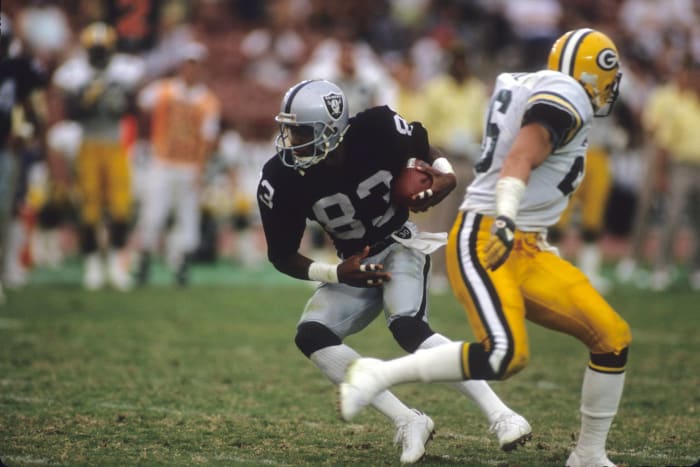
After winning medals at the 1983 World Track and Field Championships, Gault became the famed 1985 Bears' top receiver. In 1988, however, Mike Ditka's deep threat sought a trade to a California team to pursue an acting career. A year after their James Lofton deal, the Raiders traded first- and third-round picks for Gault. He played six seasons in Los Angeles, joining Mervyn Fernandez (and a strange developmental process) in delaying Tim Brown's ascent, and posted 985 receiving yards to help the Raiders to the 1990 AFC title game. The Bears used the first-rounder on cornerback starter Donnell Woolford, who played eight Chicago seasons. Gault's IMDB page does have quite a few credits.
Jeff George trade sends Andre Rison to Falcons

Seven years after their John Elway move backfired, the Colts made another high-profile quarterback trade. In 1990, they acquired the No. 1 overall pick (George), sending the Falcons Rison, perennial Pro Bowl tackle Chris Hinton (the centerpiece of 1983's Elway haul) and a 1991 first-round pick (which became Falcons wideout starter Mike Pritchard). The Colts' 1989 first-rounder, Rison made four Pro Bowls as a Falcon, totaling 48 receiving TDs from 1990-93. George busted in Indianapolis, but the Colts landed the pick that became Marvin Harrison when they dealt George to Atlanta in 1994.
Unusual trade routes Randal Hill to Cardinals
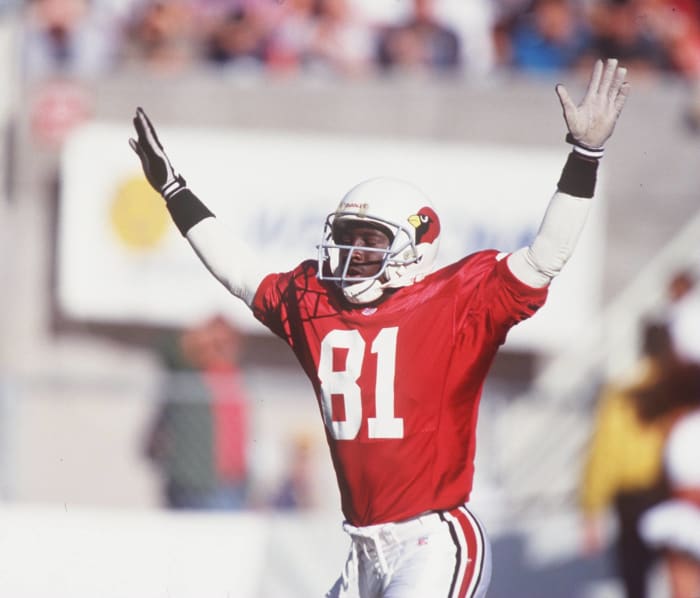
A Miami Hurricane star, Hill was set to stay in his hometown when the Dolphins made him the No. 23 overall pick in 1991. Just as he did with Anthony Carter six years earlier, Don Shula traded Hill with the goal of adding future defensive help. But this trade occurred after Hill played just one Dolphins game. The Cardinals traded their 1992 first-round pick (which became No. 7 overall) for the 5-foot-10 talent. Hill delivered four middling seasons in Phoenix and wound up with the Dolphins in 1995. Miami won the trade, using the pick on Troy Vincent. The Pro Bowl cornerback spent four years in Miami but enjoyed his best seasons in Philly.
Dolphins acquire Irving Fryar from Patriots
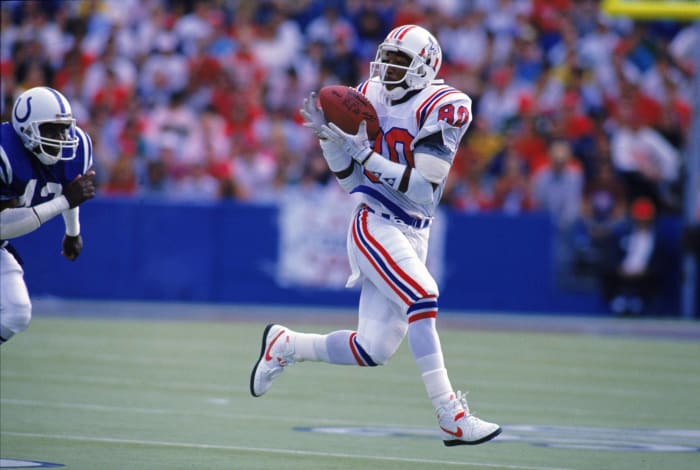
After trading away some wideouts during the Marks Brothers' run, Don Shula acquired one to start the next era. The Dolphins in 1993 dealt second- and third-rounders for Fryar — the Patriots' longtime No. 1 wideout. The trade transpired a few months into Bill Parcells' New England tenure. The No. 1 overall pick in 1984, Fryar made two Pro Bowls in three Miami seasons — the first of which coming mostly without Dan Marino in 1993. Fryar left for Philadelphia in 1996. The second-round pick turned into Todd Rucci, a starting guard for most of the Pats' Drew Bledsoe run.
Cardinals grab Rob Moore from Jets
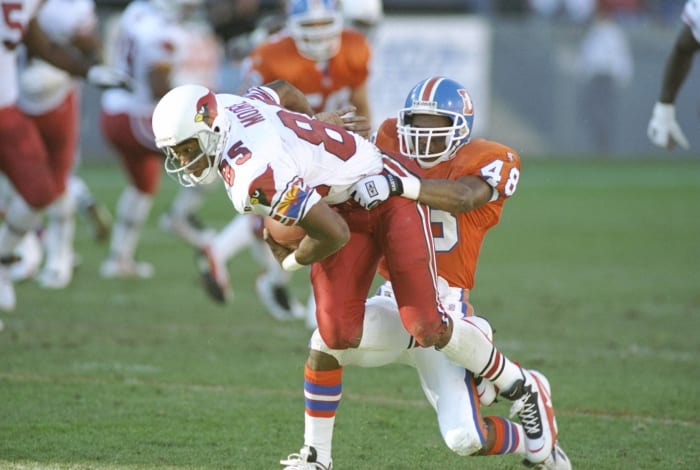
The Jets traded Moore to the Cardinals on the eve of the 1995 draft. The Cardinals sent first- and fourth-round picks, along with running back Ronald Moore, to obtain the Pro Bowl weapon. This draft, though, was known more for the Jets taking tight end Kyle Brady over Warren Sapp. The Jets did land productive defensive end Hugh Douglas with the Cards' pick. Rob Moore posted over 5,000 yards in five Cardinals years, earned All-Pro honors in 1997 and helped Arizona snap a 50-year playoff-win drought in '98. (Moore's Cards career in the No. 85 jersey also overlapped with Rod Tidwell's fake Arizona career.)
Seahawks benefit from Cowboys' Joey Galloway gamble

With Michael Irvin having suffered what turned out to be a career-ending injury in 1999, the Cowboys in 2000 made the bold move of paying up for Galloway. Seattle franchise-tagged its disgruntled wideout, and Dallas paid the two-first-rounder cost for signing him away. While Galloway did have good post-Seattle years, they came in Tampa, not Dallas. Galloway did not catch a pass from Troy Aikman, tearing an ACL in Week 1 of the 2000 season — Aikman's finale. Galloway's final three Cowboys slates, with worse quarterbacks, did not justify the trade price. The first of those Round 1 Seahawks picks became future MVP Shaun Alexander.
Buccaneers pay steep price for Keyshawn Johnson

In a contract dispute with the Jets, and no fan of new coach Al Groh, Johnson left New York for Tampa in 2000. It cost the Buccaneers two first-round picks to land their new WR1, and they gave Johnson a six-year, $52 million deal. The 1996 No. 1 overall pick, Johnson did not quite deliver in Tampa. He played three full seasons, the last of which being the Bucs' Super Bowl year, making one Pro Bowl before Jon Gruden banished him following a 2003 dispute. The trade gave the Jets an NFL-record four first-round picks in 2000. The Shaun Ellis-John Abraham-Chad Pennington-Anthony Becht quartet helped key a decent 2000s run.
Bills collect first-rounder for Peerless Price
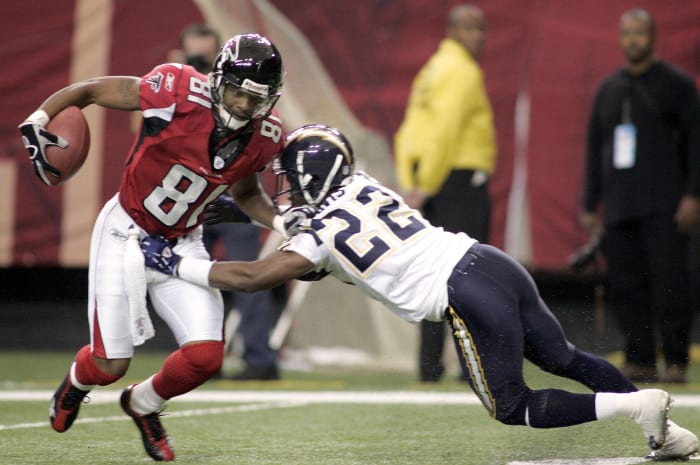
Price did not have the name value of Galloway or Johnson. Buffalo's Eric Moulds sidekick, Price enjoyed a breakout season in 2002 (1,252 yards, nine TDs) and drew the Bills' franchise tag. The Falcons traded their 2003 first-rounder to give Michael Vick another weapon; the Bills used that draft choice on Willis McGahee. Given a seven-year, $42 million contract, Price played just two seasons in Atlanta. Neither season was especially bad; they just were not worthy of the price (no pun intended). Price finished his career back in Buffalo.
Three-team trade gives Eagles Terrell Owens
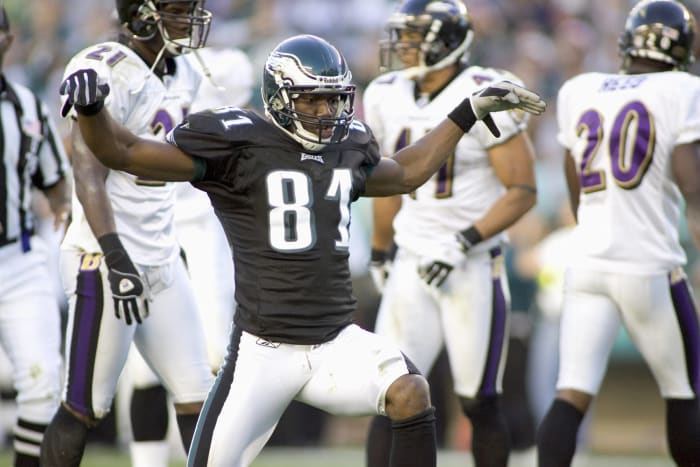
Believe it or not, Owens wanted to be an Eagle. A snafu involving a deadline for 2004 free agency led to a three-way trade that sent Owens to Philadelphia. Initially, the Ravens gave the 49ers a second-round pick for the 30-year-old superstar. But an arbitrator's ruling helped T.O. to Philly. The 49ers returned the pick, and the Eagles landed a Hall of Famer for fifth- and sixth-round picks, and D-lineman Brandon Whiting. Owens was the Eagles' missing piece in 2004, helping them to the Super Bowl. But in 2005, his contract — a seven-year, $42 million pact he'd just signed — created chaos. Andy Reid ended this episode of the T.O. soap opera seven games into the '05 slate, banishing him before a 2006 release.
Vikings trade leads to ugly Randy Moss chapter

Perhaps the biggest lose-lose trade on this list, this one scarred Moss' resume for a bit. The Vikings sent their Hall of Fame talent to the Raiders in 2005, getting back Oakland's No. 7 overall pick and linebacker Napoleon Harris. Moss' act had worn thin in Minnesota by the end of the 2004 season, which featured a strange late-game exit and a notable Joe Buck moment. Moss' low point, though, came on a 2-14 Raiders team in 2006. At 29, he averaged 42.5 receiving yards per game and was accused of loafing. The Vikings got two years from Harris, and the pick became deep-threat bust Troy Williamson.
Jets, Washington swap No. 1 targets

Santana Moss and Laveranues Coles were Jets teammates from 2001-02 before New York declined to match Washington's Coles restricted free agent offer sheet. In 2005, however, the Jets reacquired Coles in a straight-up swap for Moss. Both receivers were at odds with their teams by then, with a medical disagreement dividing Coles and Washington, and each received better contractual terms from their new franchises. As for who won the trade, Washington probably did. Moss played 10 seasons in D.C. and posted a 1,483-yard Pro Bowl showing in his first year there. Coles' Jets return lasted four years.
Patriots ship Deion Branch to Seahawks
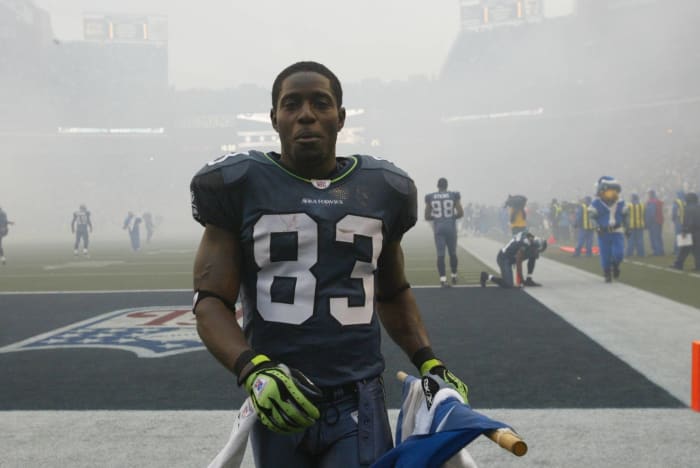
A key "don't trade with the Patriots" chapter came in September 2006, when the Seahawks surrendered a first-round pick for Branch. While the pick became short-term Patriot safety Brandon Meriweather, the defending NFC champions did not get what they paid for. In addition to parting with a high-draft choice, Seattle gave Branch the extension New England wouldn't (six years, $39 million) and saw him struggle with injuries. Branch never eclipsed 900 receiving yards in any of his four seasons on the team. The Seahawks traded Branch back to the Pats in 2010. He was again a Super Bowl team's starter in 2011.
Moss, Wes Welker create Patriot monster

Moss' woeful 2006 led to an all-time Patriots value bet: a fourth-round pick (trivia link) for a Hall of Famer who...played better in 2007. Bill Belichick paid more for Welker, giving the Dolphins 2007 second- and seventh-round choices. No one has since approached the 23 touchdown receptions Moss compiled for the unbeaten Pats in '07. Welker, tied to a $4 million-per-year deal for most of his Pats stay, moved the slot receiver position forward. His six-year Pats run produced five Pro Bowls and two All-Pro nods. These wideouts escalated Tom Brady's progression into an all-time great. The Patriots sent Moss back to the Vikings during the 2010 season.
Cowboys err with Roy Williams trade

When the Cowboys traded for Amari Cooper, skeptics pointed to past blunders. This one may be worse than Dallas' Joey Galloway deal. Jerry Jones gave the Lions first-, third- and sixth-rounders for Williams at the 2008 trade deadline then handed out a $54 million extension. A former top-10 Lions pick, Williams did not surpass 600 receiving yards in any of his three Cowboys seasons. The younger of the two Roy Williamses on Dallas' 2008 roster could not make a difference opposite Terrell Owens in 2008, and Miles Austin replaced him as a starter in '09. Detroit used the first-rounder on tight end Brandon Pettigrew.
Broncos cut cord on Brandon Marshall in Dolphins deal
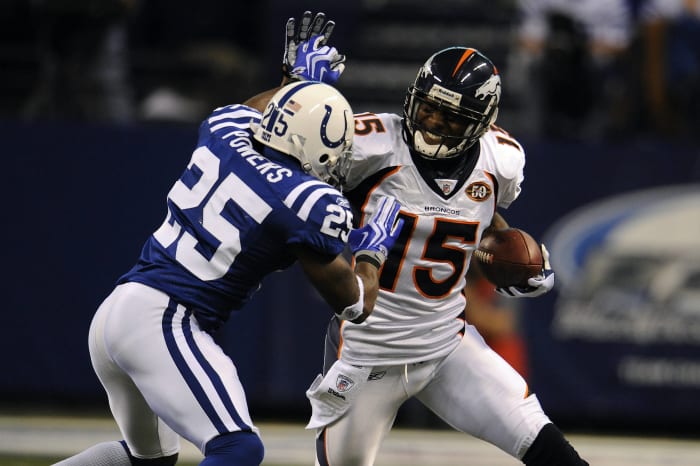
Probably the greatest receiver mercenary in NFL history, Marshall saw his travels begin in 2010. Having been involved in countless off-field incidents, including a tragic New Year's Eve in Denver, the fifth-year player was dealt to the Dolphins for two second-round picks. Josh McDaniels' brief Broncos tenure already featured 2009's controversial Jay Cutler trade. Armed with personnel control, McDaniels used one of the Marshall picks to move up for Tim Tebow in the 2010 first round. The Dolphins received one of Marshall's six Pro Bowl seasons before trading the big target to the Bears in 2012.
Seahawks' Percy Harvin trade produces one big moment

The Seahawks' 2013 decision to trade for Percy Harvin and guarantee him $25.5 million did not work out. They sent the Vikings first- and third-round picks, which became Pro Bowl cornerback Xavier Rhodes and running back Jerick McKinnon. Counting the playoffs, Harvin played only eight Seahawks games. But his kick-return score in Super Bowl XLVIII buried the Broncos. That pretty much covers Harvin's Seattle contributions. Injuries marred the 2009 first-round pick's career, which featured frequent electric plays in Minnesota. In 2014, the Jets gave up merely a sixth-rounder for Harvin. He retired two years later.
Two teams trade first-rounders for Brandin Cooks
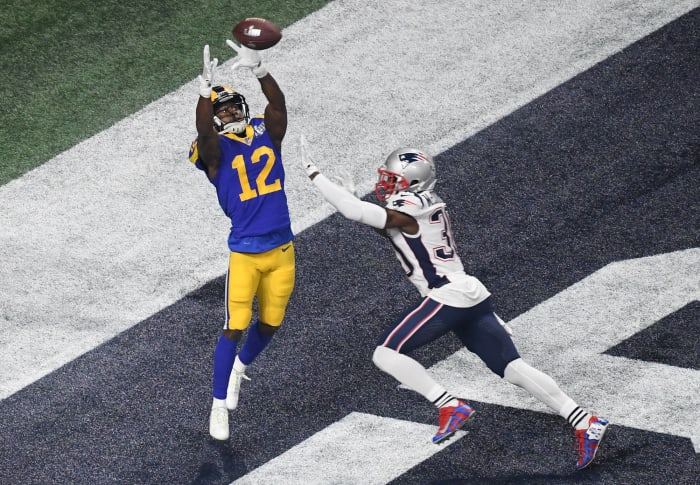
Cooks' odd career has seen him produce in three elite offenses, with two of those teams trading him rather than authorize an extension. The Saints received the 2017 No. 32 overall pick (All-Pro tackle Ryan Ramczyk) for their young deep threat, who played a key role in the Patriots reaching Super Bowl LII. In a slew of trades for 2018 picks, the Pats' most significant deal sent Cooks to the Rams for the No. 23 choice (tackle Isaiah Wynn). The Rams gave Cooks a five-year deal with $50 million guaranteed. From 2016-18, he posted 1,000-yard seasons for three teams. Cooks has now been traded four times, with the Texans and Cowboys later acquiring him.
Rebuilding Raiders ship Amari Cooper to Cowboys
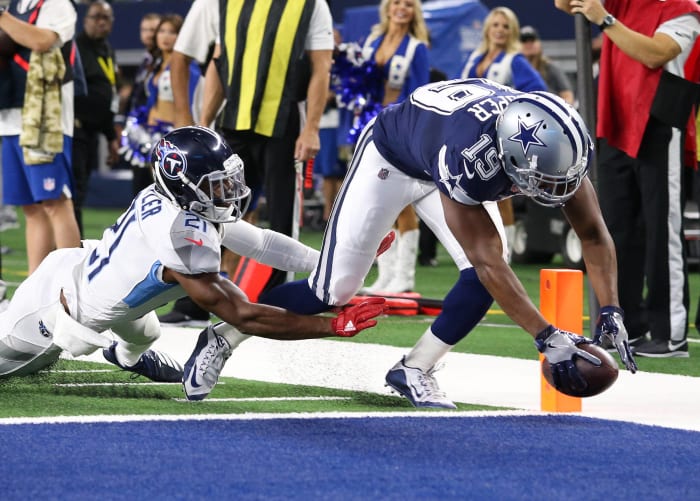
The Cowboys traded a first-round pick for Cooper before the 2018 deadline. Inconsistent during the latter part of his Raiders run, Cooper finished his nine-game Cowboys audition with 725 yards and added 171 in two playoff contests. Jerry Jones' Joey Galloway and Roy Williams misfires did not scare him from re-signing Cooper to a five-year, $100 million extension. The Cowboys cut bat on that deal in 2022, trading Cooper to the Browns for a fifth-round pick. Because of 2018's Cooper and Khalil Mack trades, the Raiders made three first-round picks in 2019. Of those, only the No. 24 pick (Josh Jacobs, via the Mack trade) panned out.
Steelers send Antonio Brown to Raiders, dismantle 'Killer B's'

Brown's NFL path changed in December 2018. An outburst during a Week 17 practice began a chain reaction that turned Brown from Steelers superstar to mercurial free agent. The Steelers dealt the 30-year-old star to the Raiders for third- and fifth-round picks in March 2019. This marked another Raiders receiver miss. Brown headaches multiplied, culminating with a near-fight with GM Mike Mayock, and led to a release before Week 1. The Patriots pounced, but their hopeful Randy Moss redux ended after two women accused Brown of sexual misconduct. While Brown rejoined Tom Brady in Tampa in 2020, he burned his final bridge during a meltdown in New Jersey a year later.
Giants reverse course, trade Odell Beckham Jr. to Browns

The most talented wideout in Giants history signed a five-year, $90 million extension in August 2018, but another injury ended Beckham's season early. Giants GM Dave Gettleman reversed course, turning "we didn't sign him to trade him" into a March 2019 deal with the Browns. Cleveland sent safety Jabrill Peppers, along with first- and third-round picks, to New York for the three-time Pro Bowler. The Round 1 pick became All-Pro D-lineman Dexter Lawrence. OBJ did not mesh in Cleveland. An ACL tear sidelined Beckham midway through the 2020 slate, and his father endorsing a montage of errant Baker Mayfield passes led to an explosive 2021 breakup. Beckham's Rams Super Bowl ring came after another ACL tear.
Texans shock NFL, send DeAndre Hopkins to Cardinals
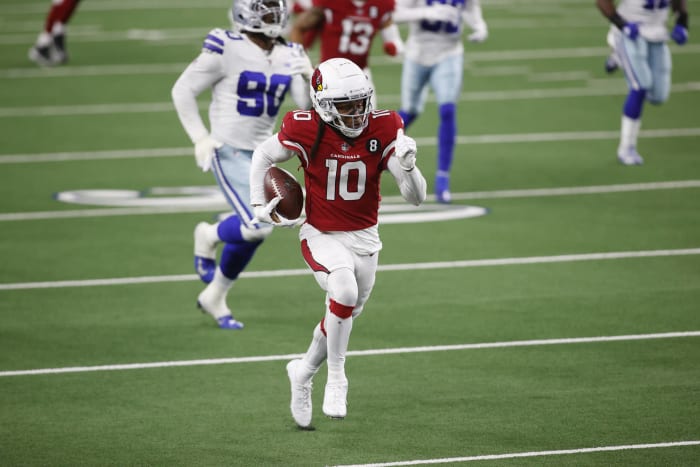
During Bill O'Brien's action-packed run as a head coach-GM hybrid, the Texans sent the third-best player in team history to the Cardinals in a deal that did not bring back a first-round pick. Despite Hopkins being 27 at the time of the March 2020 trade, the Texans only acquired a second-round pick and expensive running back David Johnson. This became one of the most panned trades in modern NFL history, and Hopkins' 2020 performance — 1,407 receiving yards, a fifth Pro Bowl — intensified that scrutiny. O'Brien, who won power struggles with two GMs in Houston, did not make it through the 2020 season.
Vikings-Bills' Stefon Diggs swap produces win-win result

Hours later, the Vikings did receive a first-round pick for trading their disgruntled wide receiver. On that eventful March 2020 day, Minnesota dealt Diggs to Buffalo for a four-pick package that included a 2020 first-rounder. That No. 22 overall pick became Justin Jefferson, whose 1,400 receiving yards were the most by a rookie in 60 years. Jefferson replaced Diggs alongside Adam Thielen, while Diggs' arrival helped Josh Allen rise from inaccurate prospect to the MVP tier. Diggs detonated in Buffalo, leading the NFL in catches and yards in 2020 and earning two All-Pro nods. The Bills eventually tired of Diggs' antics and traded him to the Texans in 2024.
Cap issues force Falcons to end Julio Jones era

New Falcons GM Terry Fontenot entered an unfavorable salary cap situation, one partially created by Atlanta's three-year, $66 million Jones extension in 2019. Jones missed seven games in 2020, but the 32-year-old wideout's 9,388 receiving yards from 2014-19 were 1,500 more than anyone else in that span. The Falcons dismantled their potential Jones-Calvin Ridley-Kyle Pitts trio by trading their Canton-bound pass catcher to the Titans for second- and fourth-round picks. Atlanta's June trade did not key a Jones resurgence. Hamstring trouble followed him to the Titans, who cut him after one season. The second-round choice became linebacker Troy Andersen.
Davante Adams reunites with college QB in Vegas

Seemingly readying for another ride with Adams and Aaron Rodgers, franchise-tagging the former and extending the latter, the Packers took a wildly different route by dealing the All-Pro wideout to the Raiders. The March 2022 trade reunited Adams with college QB Derek Carr. The Raiders then gave Adams a five-year, $140 million extension. Adams sought a Las Vegas move but became unhappy after the Raiders cut Carr in 2023. Sulking during Jimmy Garoppolo's brief stay, Adams maneuvered his way to a short-lived Rodgers Jets reunion in 2024. The Packers used the first-round pick on linebacker Quay Walker and rebuilt around younger wideouts; the Raiders regime behind this trade was out by Halloween 2023.
Adams contract changes Chiefs' Tyreek Hill plans
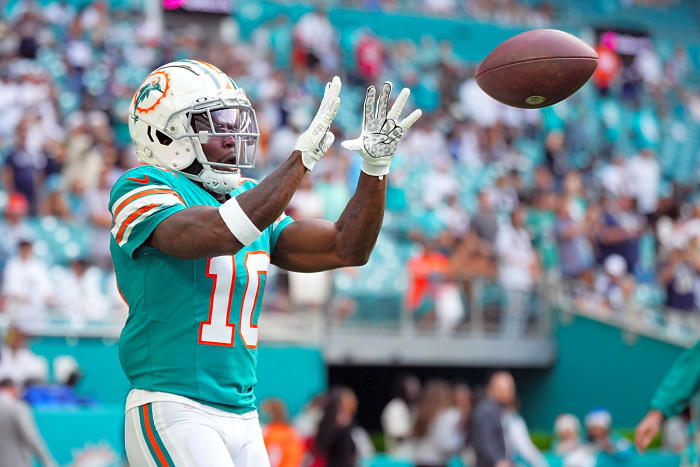
Barely a week after Adams agreed to a position-record contract, the Chiefs decided against giving into Hill's demands for a deal in that ballpark. They dealt Patrick Mahomes' speed merchant to the Dolphins for a five-pick package headlined by first- and second-rounders. Miami gave Hill a market-setting extension ($30 million per year). Kansas City did better than Green Bay in its March 2022 trade; the first-round pick became All-Pro cornerback Trent McDuffie. Hill played a central role in elevating Tua Tagovailoa, dominating in back-to-back 1,700-yard seasons. Off-field trouble and on-field antics remain key Hill storylines, however, and the Chiefs ended up winning back-to-back Super Bowls despite cutting costs at receiver.
Titans' A.J. Brown misread keys changes, equips Eagles
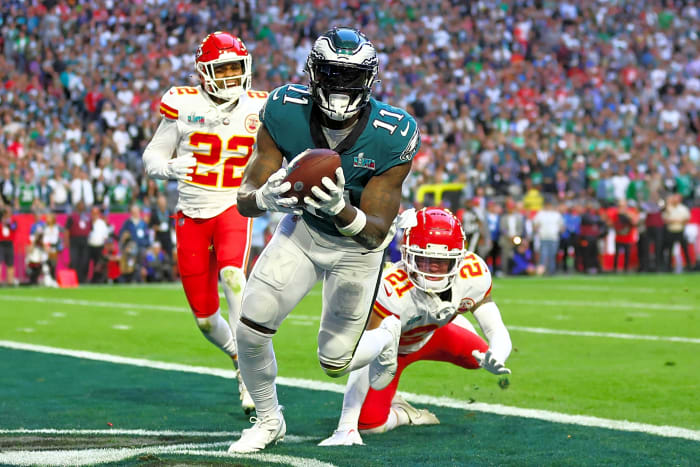
Fast emerging in Tennessee, A.J. Brown reached extension eligibility at an interesting time. As the Titans began talks, the market exploded thanks to 2022's Adams and Hill deals. Other wideouts cashed in, and many of Brown's 2019 draft classmates were up for new deals. Not offering Brown $20 million per year, the Titans appeared to misread the changing WR market. The Eagles acquired Brown in a draft-night swap involving a first-round pick and then gave him a $25M-per-year extension. Brown proceeded to break the team's single-season receiving yards record in 2022. Helping power the Eagles to two Super Bowls, Brown has three 1,000-yard seasons with Philly. The Titans fired GM Jon Robinson months after the trade.
Sam Robinson is a sportswriter from Kansas City, Missouri. He primarily covers the NFL for Yardbarker. Moving from wildly injury-prone sprinter in the aughts to reporter in the 2010s, Sam set up camp in three time zones covering everything from high school water polo to Division II national championship games
More must-reads:
- NFL Draft Watch: Best bet in first round for each AFC team
- Will concerning update on star DT change Raiders' draft plans?
- The 'AP NFL Comeback Players of the Year' quiz
Breaking News
Customize Your Newsletter
 +
+
Get the latest news and rumors, customized to your favorite sports and teams. Emailed daily. Always free!
PRIVACY POLICY EDITORIAL POLICY CONTACT US
ABOUT YARDBARKER TERMS OF SERVICE
Use of this website (including any and all parts and
components) constitutes your acceptance of these
Terms of Service and Privacy Policy.
This site is for entertainment purposes only.
There is no gambling offered on this site.
Gambling Problem? Call 1-800-Gambler.
